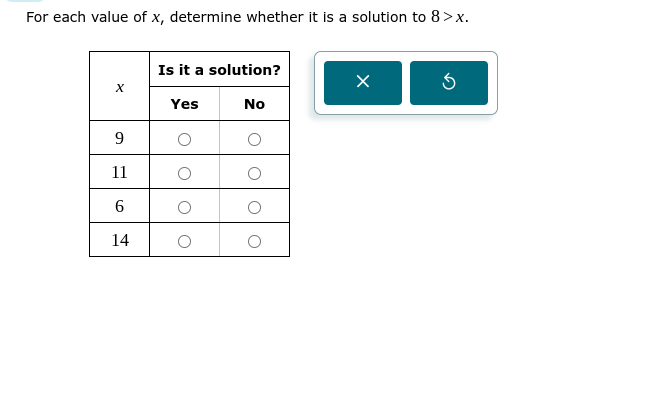For each value of x, determine whether it is a solution to 8 > x.

Understand the Problem
The question is asking whether each given value of x satisfies the inequality 8 > x. We need to evaluate each value (9, 11, 6, 14) in relation to this inequality.
Answer
- For $x = 9$: No - For $x = 11$: No - For $x = 6$: Yes - For $x = 14$: No
Answer for screen readers
- For $x = 9$: No
- For $x = 11$: No
- For $x = 6$: Yes
- For $x = 14$: No
Steps to Solve
- Evaluate x = 9
Substitute $x = 9$ into the inequality $8 > x$.
The inequality becomes $8 > 9$. This is false.
- Evaluate x = 11
Substitute $x = 11$ into the inequality $8 > x$.
The inequality becomes $8 > 11$. This is false.
- Evaluate x = 6
Substitute $x = 6$ into the inequality $8 > x$.
The inequality becomes $8 > 6$. This is true.
- Evaluate x = 14
Substitute $x = 14$ into the inequality $8 > x$.
The inequality becomes $8 > 14$. This is false.
- For $x = 9$: No
- For $x = 11$: No
- For $x = 6$: Yes
- For $x = 14$: No
More Information
The inequality $8 > x$ means that $x$ must be less than 8 to satisfy the condition. Values greater than or equal to 8 will not be solutions.
Tips
- Misinterpretation of the inequality: Remember that $8 > x$ means $x$ must be less than 8.
- Overlooking negative values: If negative numbers were included, they would always satisfy $8 > x$, as all negative numbers are less than 8.
AI-generated content may contain errors. Please verify critical information